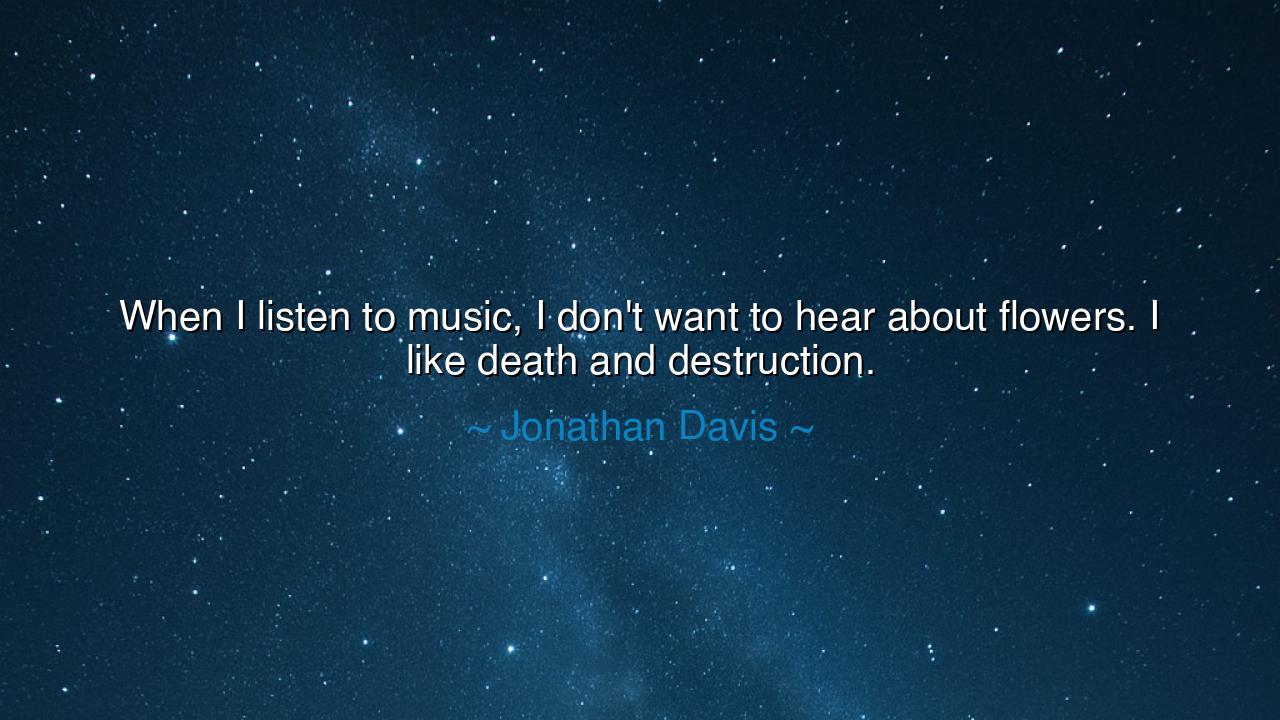
When I listen to music, I don't want to hear about flowers. I
When I listen to music, I don't want to hear about flowers. I like death and destruction.






The words of Jonathan Davis — “When I listen to music, I don't want to hear about flowers. I like death and destruction.” — may sound, at first, like a cry from the darkness, but within them burns a profound truth about the nature of art, pain, and honesty. For the singer, who rose from anguish to give voice to generations of the broken and misunderstood, is not celebrating ruin — he is seeking truth in suffering. His rejection of “flowers” is not hatred of beauty, but rejection of falseness. He speaks for all who have seen the shadowed side of life and refuse to paint it over with lies. His words remind us that to face the darkness is not to love it, but to be courageous enough to look at it without flinching.
Since the dawn of time, mankind has sung of both creation and destruction, of life and its twin, death. The ancients told of Orpheus, whose music could charm even the stones, and who descended into the underworld to reclaim his beloved. His song was not of flowers and sunlight, but of grief and longing — the music of a soul that had seen both heaven and hell. In this, Davis stands in that same lineage: an artist who refuses to deny the abyss, who transforms anguish into melody so that others might find catharsis. His music, like Orpheus’s, is not a song of despair, but of defiance — the cry that says, “Even in darkness, I will create.”
To like death and destruction is, in truth, to recognize that within these forces lies a terrible beauty — the beauty of truth, of endings that make beginnings possible. The flower cannot bloom unless the seed first dies. The world renews itself through the very destruction we fear. In music, as in life, the most powerful notes are born from contrast — from the trembling edge between agony and peace. Davis’s rejection of shallow beauty is thus a devotion to authenticity, to art that bleeds, that breathes, that tells the whole story of what it means to be human.
Consider the story of Ludwig van Beethoven, who, after losing his hearing, composed symphonies that shook the heavens. His world was silence, yet his spirit thundered with fury and brilliance. The Ninth Symphony, with its triumphant “Ode to Joy,” was not the product of a happy man, but of one who had wrestled despair and refused to yield. Like Davis, Beethoven found that creation born of suffering carries more truth than sweetness born of comfort. Both artists understood that joy untested by sorrow is hollow — a song without a soul.
Davis’s words also reflect a rebellion against the shallow and the artificial, a stance as old as art itself. The poets of every age have fought against the temptation to decorate life’s pain instead of understanding it. To sing of “flowers” when the world burns is to betray the listener. True artists, like prophets, are those who dare to speak of the storm, to name the monsters that others hide from. They do not worship destruction — they reveal it, so that in seeing it, we may begin to heal.
And yet, his statement is not without tenderness. To “like death and destruction” is not to celebrate suffering, but to find beauty even in ruin — to know that truth and growth dwell there. The shattered heart still beats; the burned field will bloom again. In facing pain, we discover resilience; in listening to the darker music, we find strength. Davis reminds us that healing does not come from denial, but from confrontation. Only when we walk through the fire do we emerge purified, wiser, and more whole.
Let this then be the lesson for those who seek to live deeply: do not fear the darkness. Do not run from sorrow, from loss, or from the harsh music of truth. Face it. Listen to it. Let it teach you. For in the ashes of destruction lie the seeds of creation. In pain lies understanding. In shadow, the shape of light is born. As Jonathan Davis teaches, to seek comfort in the storm is not madness — it is the mark of a soul that refuses to be broken by illusion.
So, my children of the future, when you hear a song that trembles with rage or grief, do not turn away. Listen. For within that chaos lies the pulse of the human heart — fierce, raw, and real. And when your own days darken, remember: even the music of death and destruction is still music — and as long as you can hear it, you are still alive.






AAdministratorAdministrator
Welcome, honored guests. Please leave a comment, we will respond soon